Yellow
Showing 61–72 of 100 results
-

Packera cana / woolly groundsel
- yellow, daisy-like blossoms with 8-13 ray florets ("petals")
- golden, central disks
- blossoms in flat-topped clusters of up to 15
- mostly basal leaves - unlobed, hairy, ovate, up to 2 inches long
- overall silvery appearance
-

Packera multilobata / lobeleaf groundsel
- deeply lobed leaves, mostly at the base of the plant
- bright yellow daisy-like flowers, 10-30 in a cluster per plant
- orange-yellow disk florets
- woodlands, foothills, and generally dry/ sandy/ rocky places.
-
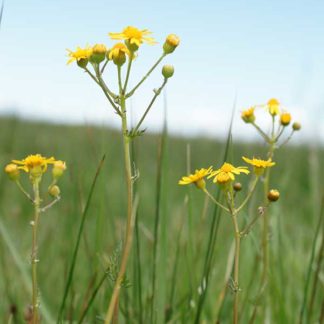
Packera pseudaurea / falsegold groundsel
- yellow, flat-topped cluster of daisy-like flowers
- oval, erect basal leaves with long petioles and round/blunt-toothed edges
- generally in moist to wet habitats
-

Packera streptanthifolia / Rocky Mountain groundsel
- yellow-flowered composite; "flowers" on branched inflorescence
- 8-13 half-inch ray florets, usually spaced apart
- thick, spatula-shaped basal leaves without teeth or clefts
- thin, often deeply lobed stem leaves
- dry woodlands and rocky places
-
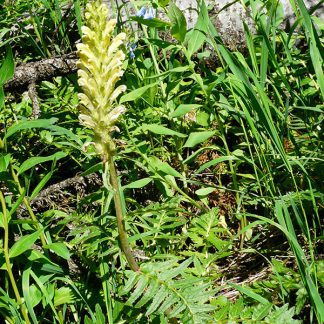
Pedicularis bracteosa / towering lousewort
- dense, narrow inflorescence on upper half of stem
- yellow, beak-like flowers with upper and lower lips
- flowers from bottom to top
- conspicuous, fern-like leaves
- old flowers become light brown but remain on stalk
-
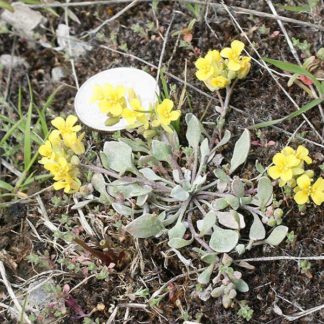
Physaria spp / twinpods
- yet another very small yellow crucifer/brassica
- densely hairy leaves, tapering to a petiole
- bloom in early spring on minimal soil in rocky places
- fruit characteristics TBPL
-

Potentilla fruticosa / shrubby cinquefoil
- low, deciduous, shrub; wetlands and riparian zones
- yellow buttercup-like flowers with 5 leaflets, often in clusters
- blooms from June until frost
- pinnately compound leaves, typically with 5 leaflets
- fruit (achene) remains into winter
-

Potentilla gracilis / slender cinquefoil
- yellow, 5-petaled flowers with many stamens
- petals touch or overlap
- leaves with 5-9 toothed, deeply cut lobes
- leaves may be hairy, especially below
- many different exposed habitats
-
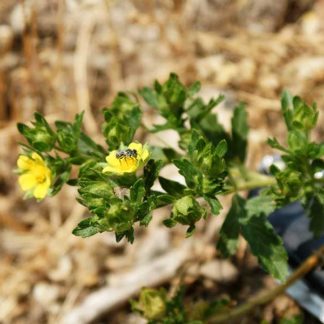
Potentilla norvegica / rough cinquefoil
- 5 yellow petals, not fused
- 5 sepals longer than petals, esp. after flowering
- numerous stamens and pistils
- compound leaves with leaflets grouped in 3s
- prominent veins; toothed margins
- hairy stems
- mostly in disturbed areas, including gardens
-
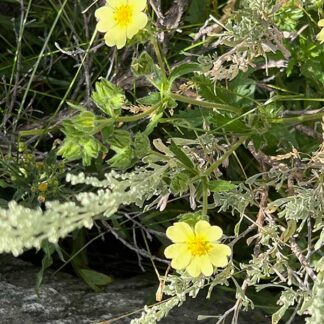
Potentilla recta / sulfur cinquefoil
- perennial
- 8 to 30 stems per plant, each with 1-60 flowers
- petals are light yellow; centers are darker, sulfur yellow
- shiny, erect hairs arise at right angles to the stems.
- leaves are alternate and palmately compound, 5-9 leaflets per leaf
- invades both disturbed and undisturbed habitats
-

Purshia tridentata / antelope bitterbrush
- small yellow, 5-petal flowers in early spring
- small shrub, often in large "clumps"
- leaves look like sagebrush (Artemesia tridentata)
-
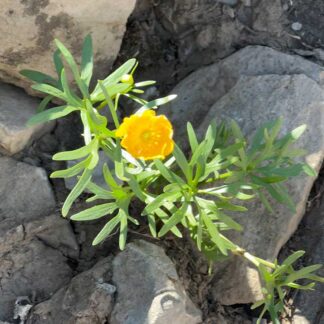
Ranunculus adoneus / alpine buttercup
- short, high altitude plant
- rocks or moist meadows
- yellow "buttercuppy" flowers, 5-10 petals
- huge numbers of stigmas
- highly lobed, finely dissected leaves
Showing 61–72 of 100 results